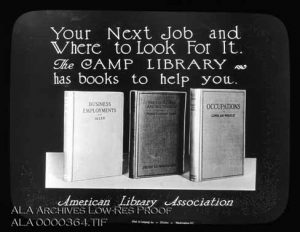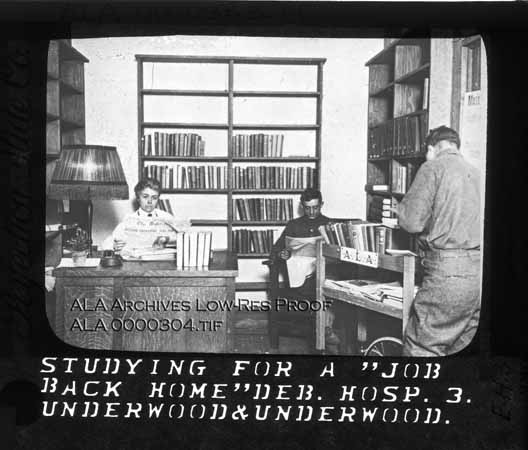
Veterans Day honored the signing of the armistice on November 11, 1918, bringing an end to the fighting of the Great War. Angela Jordan has already detailed the work done by the American Library Association during the war, however the ALA’s role did not end on the eleventh hour of the eleventh day of the eleventh month. The time after the signing of the armistice would actually account for one of the busiest periods for the ALA during the war.
During the 1919 ALA Annual Conference, the War Service Committee noted that: “The signing of the armistice on November 11, 1918, brought fresh demands and opportunities and opened the way for a work which in volume and extent far exceeded previous efforts. The large camps at home were far slower in closing than had been expected … hospital service quickly assumed surprising proportions; service to crews and soldiers required tens of thousands of books …”[1]
Servicemen who were still in Europe, hospitals, in transport, and even military camps back at home, were in need of books for entertainment. There was a fear amongst military authorities over morale and the restlessness of soldiers who were far from home.[2] One publication produced by the ALA warned of the need for books to keep servicemen from longing for home and keep them occupied, “They need books to offset tendencies to roam away from camp, to keep doubtful company, to brood and to long for home. The men must be kept in a cheerful, contented frame of mind.”[3]
However, this demand for books and magazines would prove to be an uphill battle for the ALA. While the association experienced great success in collecting books, money and volunteers during the war, the urgency for these donations and services faded in the eyes of the public after November of 1918: “But the general public, solicited for continuing supplies of books and magazines, even some librarians and library trustees … have often surprisingly failed to appreciate that the armistice ended neither the war nor the imperative need of service to the forces which were waging it.”[4]

Beyond supplying books to servicemen, the ALA also started job training to help former soldiers integrate into the workforce back at home. Vocational courses were provided, technical manuals and books were stocked in the libraries, and the ALA produced publications such as Books at Work and Your Job Back Home, which encouraged men to study and provided listings of resources.
A letter from an ex-sergeant was published to illustrate the importance of the ALA’s work after the armistice: “After the armistice was signed I visited the Library practically every day until discharged and was able to study and complete plans for my life-work.” He continued to write for a need for a library within his community at home and that he would even pay of the same library services he had during and after the war.[5] The demands for library services were not just perceived by the association or by military authorities, they were genuine needs from former servicemen.
While public concern over the war and its aftermath waned, the ALA continued to provide books and services to men in need of them. The ALA’s war service would peak in April 1919, almost half a year after the armistice was signed.[6]
[1] Papers and Proceedings of the Forty-First Annual Meeting of the American Library Association, (Chicago, 1919), pg. 191 Record Series 5/1/2, American Library Association Archives, University of Illinois at Urbana-Champaign.
[2] Dennis Thomison, A History of the American Library Association 1876-1972, (Chicago, 1978), pg. 68-69, Record Series 13/2/14, American Library Association Archives, University of Illinois at Urbana-Champaign.
[3] Soldiers, Sailors and Books, (1918), pg. 8, Record Series 89/1/60, American Library Association Archives, University of Illinois at Urbana-Champaign.
[4] Papers and Proceedings of the Forty-First Annual Meeting of the American Library Association, pg. 191.
[5] Books at Work, (Washington DC, 1919), Record Series 89/1/60, American Library Association Archives, University of Illinois at Urbana-Champaign.
[6] Thomison, A History of the American Library Association 1876-1972, pg. 70.